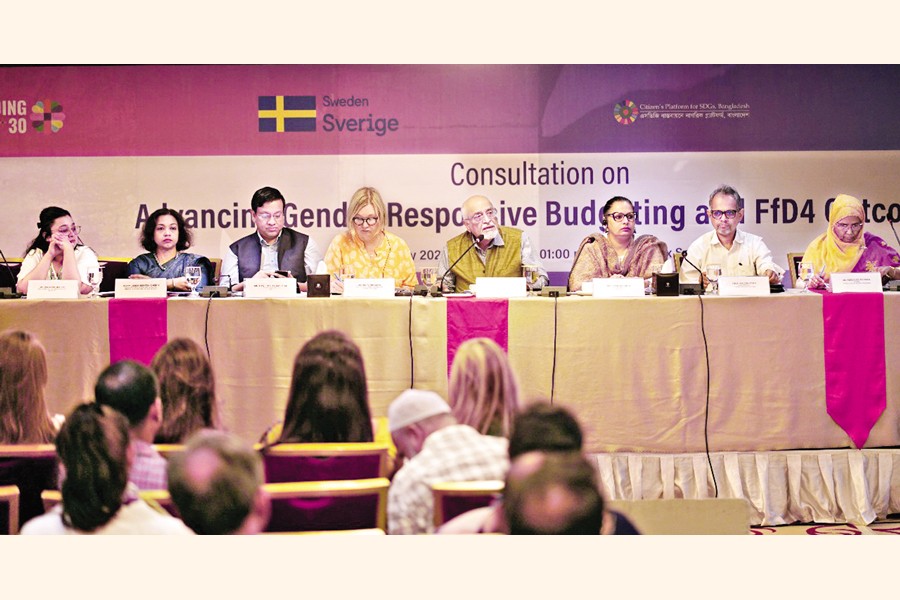
Published :
Updated :

As the current economic recession continues to hurt women disproportionately, speakers at a consultation have stressed on reviewing the concept of gender-responsive budget (GRB) for operational allocation in the upcoming budget to ensure inclusive women development in the era of digitalisation and Fourth Industrial Revolution (4IR).
Questioning the real impact of GRB by allocating 34 per cent of the budget for 44 line ministries since its introduction in 2009, they said gender-responsive budget should focus on a wide range of areas from marginal groups' vulnerability to their empowerment economically, socially and politically through capacity building and ensuring justice.
The speakers observed that in absence of a tracking mechanism, monitoring and quality reporting, impacts of the GRB allocation are hardly transformed to all sections.
They also said financial data analysis is also not well integrated into different financial models to understand the gender budget performance from different compositions during the period.
The speakers shared these views during the consultation on advancing gender-responsive budgeting and FfD4 (financing for development), organised by Citizen's Platform for SDGs, Bangladesh in collaboration with UN Women in the city on Monday.
Dr Debapriya Bhattacharya, Distinguished Fellow of Centre for Policy Dialogue (CPD) and Convenor of Citizen's Platform, moderated the consultation.
Head of Development Cooperation of Embassy of Sweden Maria Stridsman attended the event as the guest of honour, and Joint Secretary of Economic Relations Division (ERD) Abul Kalam Azad was the special guest.
CPD Senior Research Fellow Towfiqul Islam Khan, UN Women Programme Analyst - Gender Statistics Nubayra Jaheen, and Bangladesh Mahila Parisad Central Legal Aid Secretary Rekha Saha presented separate papers, highlighting gender lens, overview of GRB and charter of demand, and financing for gender equality and empowerment.
Among others, member of Women's Affairs Reform Commission Ferdousi Sultana, Deputy Secretary of Ministry of Finance Nazmun Nahar Hamid, and Deputy Secretary of Ministry of Women and Children Affairs Tasnim Zaben Binte Sheikh also spoke on the occasion.
Adv Salma Ali of Bangladesh National Women Lawyers Association, Maleka Begum of BMP, Rubaba Dowla of AmCham, Asif Ibrahim Novera of Bkash, Sumaiya Islam of Bangladesh Nari Sramik Kendra, Tahmina Rahman of Bangladesh Garment Industrial Workers Federation, and student of Jahangirnagar University Camelia Sharmin Chura also shared their views for more participatory and acceptable gender-responsive budget in the upcoming budget.
The Swedish ambassador highlighted the need for competency in budget analysis and in-depth knowledge on operation of all sectors.
She said the budget is reform-centric and GRB review is necessary from various points of view, including climate change. GRB must have coverage on climate adaptation in critical point at a time when the country is going through different reforms.
Towfiqul Islam Khan highlighted women's vulnerability in employment, as 80 per cent employment are characterized by low productivity and return, and two third of young women are not in employment, education or training.
Rekha Khan highlighted the charter of demands prepared through consultation with 100 individuals and organisations across the country. She focused on transparency in budget allocation and execution policies, laws and recommendations for increasing women leadership, improving working condition, combating corruption, etc.
Ferdousi Sultana highlighted the GRB issues from market-driven data to reduce repetition and improve efficiency level of women in health, education, employment, etc. She said right allocation and right focus are very critical for the overall governance system.
Rubaba Dowla laid importance on empowering women through digital technology in the era of 4IR, and opined that GRB focus must include access of women to digital literacy and quality training. She focused on the use of AI (artificial intelligence) in real-time budget allocation and utilisation.
smunima@yahoo.com


 For all latest news, follow The Financial Express Google News channel.
For all latest news, follow The Financial Express Google News channel.